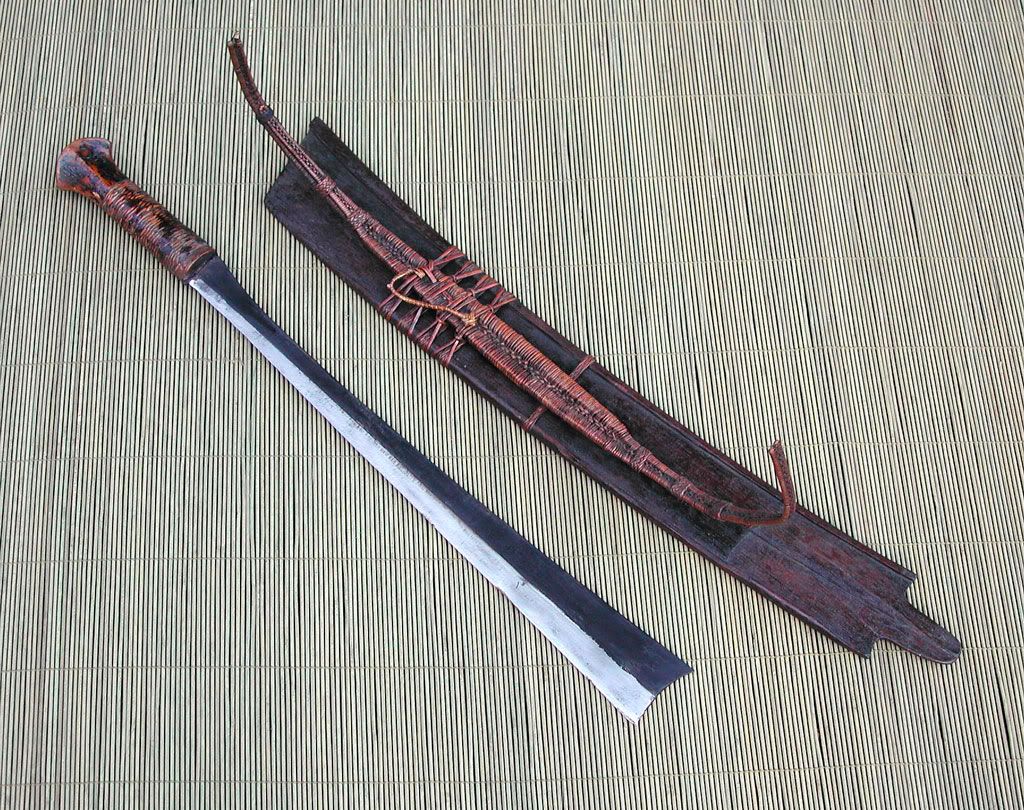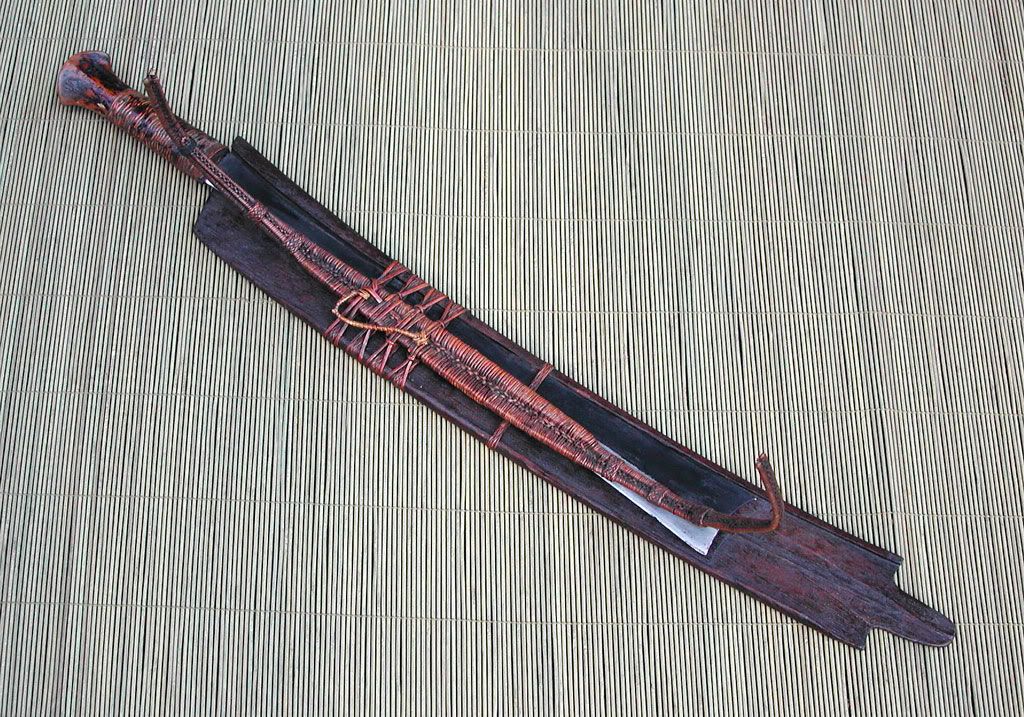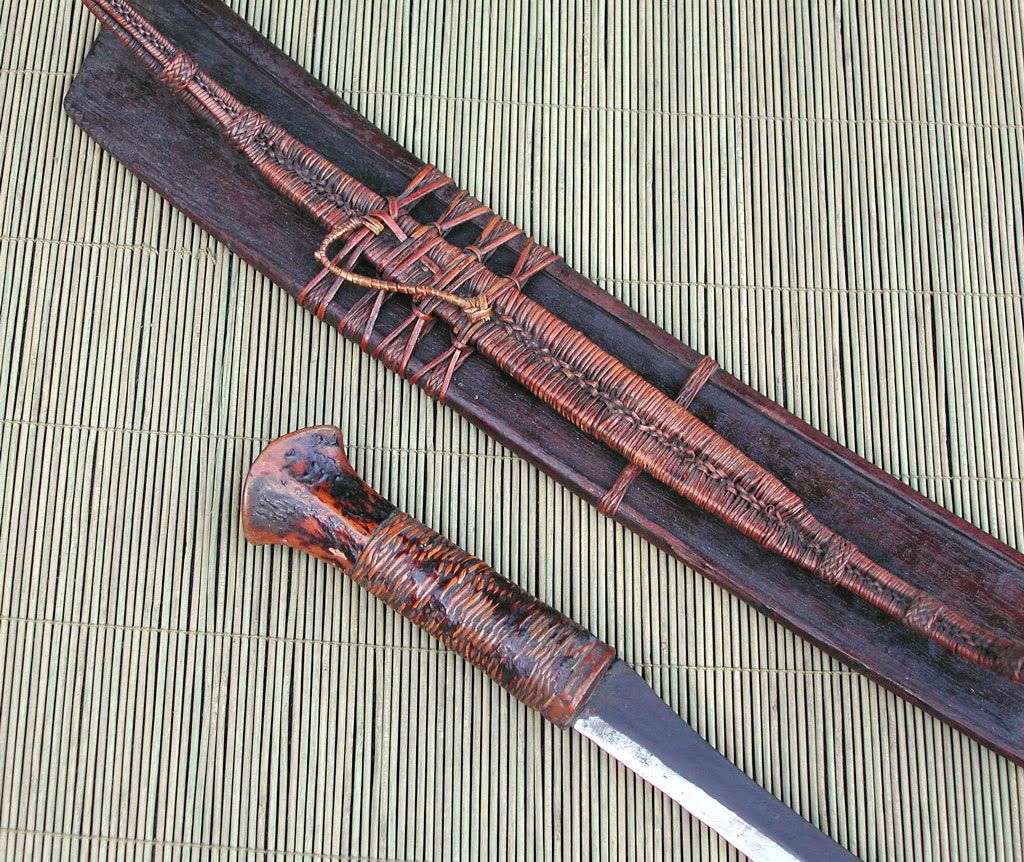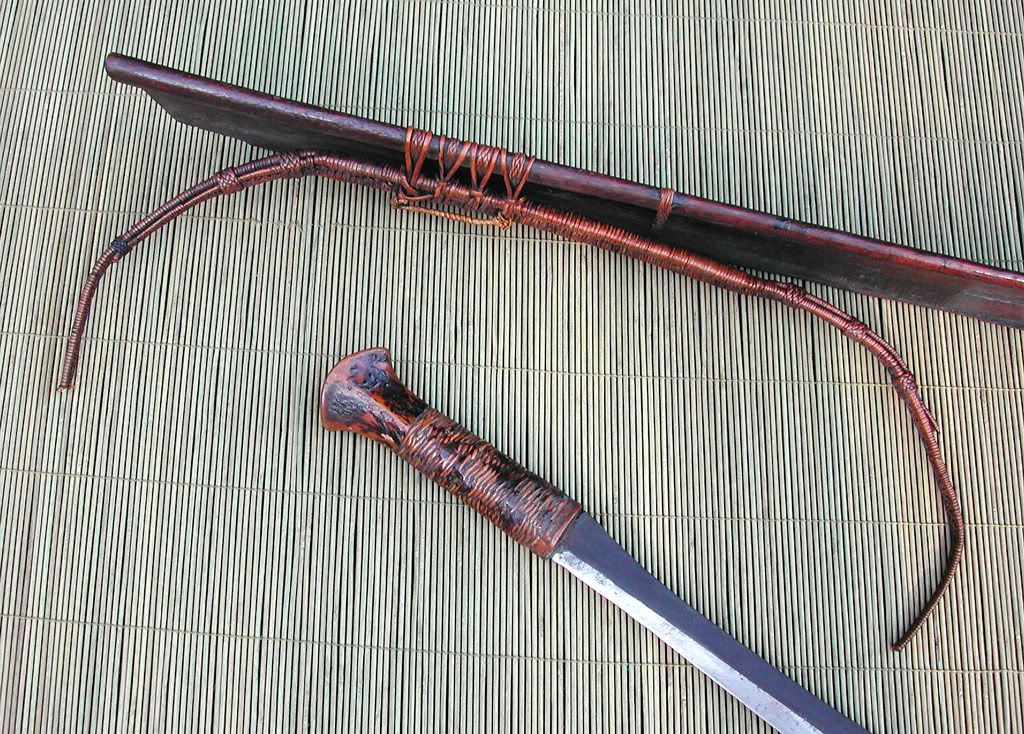
 |
|
|
|
|
#1 |
|
Member
Join Date: Dec 2004
Location: Kernersville, NC, USA
Posts: 793
|
I've wanted one of these for a while, especially after reading the book "Naga Path". Finally bid enough on Ebay to get a fair example. Carrying loop broken, but otherwise complete. Supposedly picked up by a soldier in Burma in WWII. (aren't they all?) Handle wrapping covered in pitch. The spine and top half of the blade is coated with paint, or black pitch. Any info appreciated.
Thanks, Steve    
|
|
|

|
|
|
#2 |
|
(deceased)
Join Date: Dec 2004
Location: East Coast USA
Posts: 3,191
|
Ferg
Nice dao  will you be able to repair the belt? will you be able to repair the belt?Congrats Lew |
|
|

|
|
|
#3 |
|
Member
Join Date: Dec 2004
Location: College Park, MD
Posts: 186
|
It's a nice dao. It’s not necessarily Naga. There’s a tendency to lump together as ‘Naga’ many of the weapons of the hills of India’s northeast. That form of dao appears to originate with the Kachin/Jingpho and the Khamti but is found among the Lisu, Eastern (northeastern) Naga, and others. In general, the Naga had limited access to iron/steel and often purchased it from outsiders, including the people of the Assam plains, English tea planters (famously using old hoe blades), but for metalworking and the creation and trade of dao blades, eastern tribes like the Kalyo-Kengyu and Konyak seem to have been foremost. But most Nagas carried rather differently shaped daos; this type seems to be fairly rare in photos at least. On average, Naga dao blades look cruder than the typical Kachin dao as well. It seems that much technological innovation among the Nagas came from the east, including crossbows.
Kachin/Khamti-type daos have flared pommels. It seems that on many Kachin and Khamti daos, at least, the pommel cap is of ivory, with Khamti examples often having squared-off ends of the ‘flare’ (similar to the hilts of some Adi and Mishmi long knives). Other examples often have plainer, more rounded hilts/pommels of all wood. This could indicate that it belonged to a different people or was made for harder or more utilitarian function or represents some simplification over time or even wartime scarcity of materials (I too have one that I am convinced is a simple WWII bring-back, likely from Burma). One type of Kachin-type dao blade is pattern-welded in the manner of many Tibetan sword blades. Written sources and photos would suggest that they could be found in the general area where these people above meet, perhaps in northernmost Burma, around the Dhemaji, Dibrugarh, Tinsukia and Sibsagar districts of Assam, the adjacent portion of Nagaland, the Tirap (Dirap) District of Arunachal Pradesh, and perhaps as far south and west as northern Cachar. Three varieties pictured below: one with ivory pommel cap and brass ferrule (grip wrap missing), probably late nineteenth century; one with lacquered wood grip with lozenge-section pommel, early/mid twentieth century; one long (28-1/4”/72 cm) example with fiber-wrapped hilt and “hairpin” laminated blade. |
|
|

|
|
|
#4 |
|
Member
Join Date: Dec 2004
Location: Kernersville, NC, USA
Posts: 793
|
Lew,
I probably won't try to make a repair. I doubt that I could make it look original. Thanks. Dennee, Wow. Great information and superb pictures. Thanks so much. That's why I love this place. Steve |
|
|

|
|
|
#5 |
|
(deceased)
Join Date: Dec 2004
Location: East Coast USA
Posts: 3,191
|
Dennee
Here are two of mine the bottom one is axe like is it Kachin or Naga in your opinion? Lew |
|
|

|
|
|
#6 |
|
Vikingsword Staff
Join Date: Dec 2004
Location: The Aussie Bush
Posts: 4,200
|
Hi Lou and Dennee.
Pardon my intruding but the weapons of this area are a particular interest, especially in relation to the Kachin (Singpho) who appear to have borrowed several styles of dao and dha from their neighbors -- the working dao of the Khamti, and perhaps the sword-dha from the longer versions used by the Assamese and nearby groups. Dennee has made some excellent points about the tribal differences and interactions in weapons styles of the N.E. India/Assam/Nagaland area. Lou's two examples highlight a couple of those differences. The top one being a Khamti/Kachin dao (worn in an open faced scabbard) and the bottom one is a typical Naga dao (worn in a wooden frog over the right buttock). An excellent reference for this area is Ian Heath's Armies of the 19th Century: Asia. 3. India's N.E. Frontier. Foundry Books, Guernsey. 1999. Ian. |
|
|

|
|
|
#7 |
|
Member
Join Date: Dec 2004
Location: What is still UK
Posts: 5,807
|
This is nice to see. I have not seen the use of the black iron scale for decorative contrast on these before. You could add a picture on the thread, black and white blades, I started some weeks ago. I have a dao with punched dots as decoration where some have an etched pattern in imitation of folded steel, there is also this strange design.
|
|
|

|
|
|
#8 |
|
(deceased)
Join Date: Dec 2004
Location: OKLAHOMA, USA
Posts: 3,138
|
THE DESIGN LOOKS LIKE A LEOPARD LAYING ON ITS BACK WITH ITS FEET IN THE AIR. IT WOULD BE ON ITS FEET IF LOOKED AT THE OTHER WAY

|
|
|

|
 |
|
|